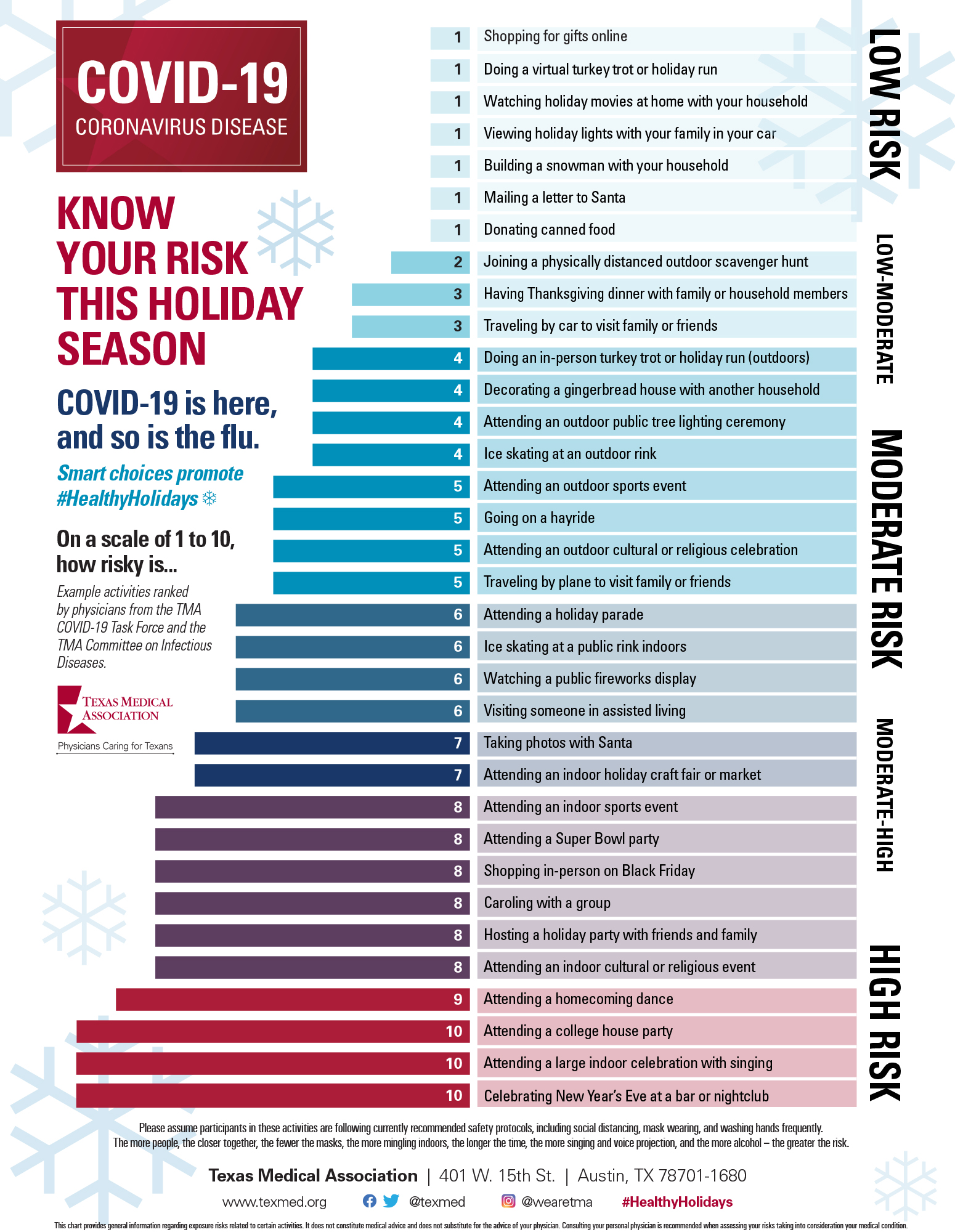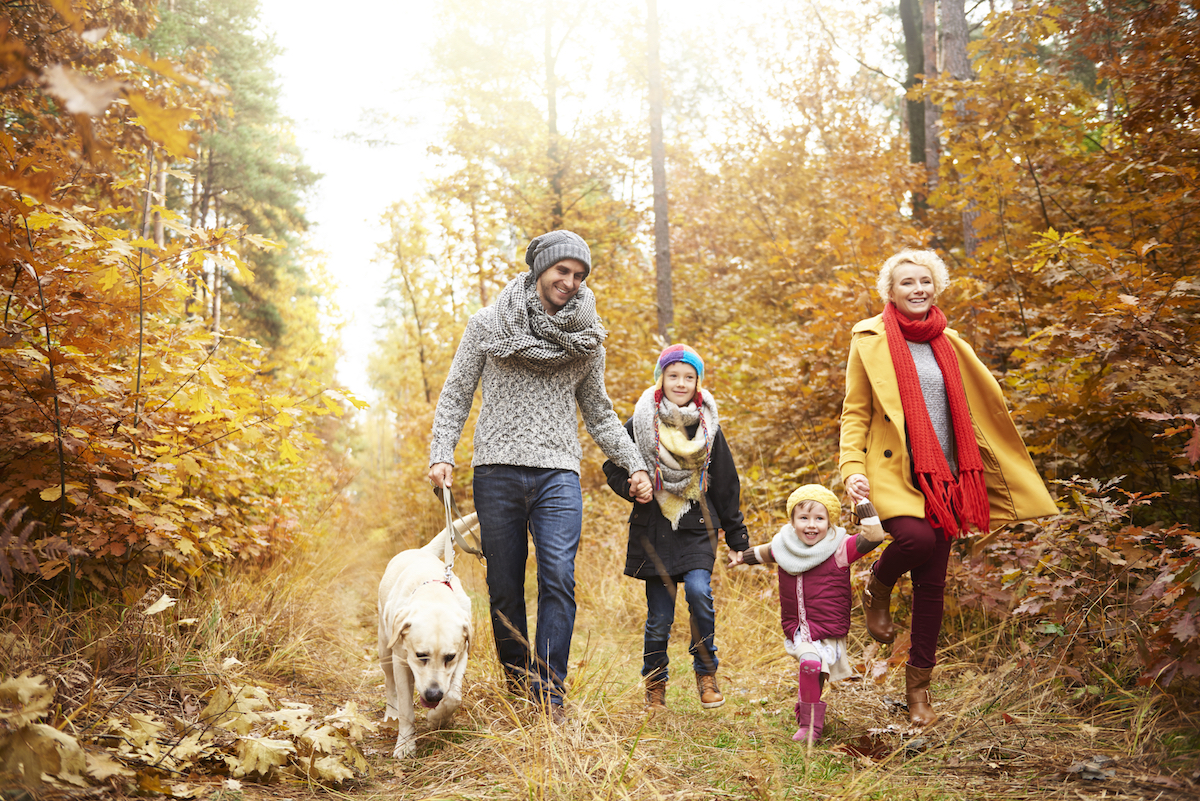Tag: Social Isolation
Home for the Holidays
December 17, 2020

As 2020 comes to a close, memories of past holiday gatherings with family and friends may increase the stressful and isolating feelings you have experienced during the COVID-19 pandemic. Holiday celebrations will be different this year to prevent the spread of COVID-19.
Texas Medical Association has compiled a Know Your Risk This Holiday Season chart to provide a list of high-risk activities to avoid and fun alternatives to adapt that pose lower risk of spreading COVID-19. The chart ranks 34 holiday activities from least to most risky so holiday revelers can make informed choices during the busiest travel and social-gathering season of the year. Among the least risky items on the chart are shopping for gifts online, watching holiday movies at home, or viewing holiday lights with your family in your car. The riskiest activities include attending a large indoor celebration with singing, attending a college house party, and celebrating New Year’s Eve at a bar or nightclub.
The Centers for Disease Control and Prevention (CDC) reports that the best way to stay safe and protect others this holiday season is to stay home and celebrate with people with whom you live. Getting together with family and friends who do not live with you can increase the chances of getting or spreading COVID-19 or the flu.
Travel Plans up in the Air
Travel is highly discouraged because it may increase your chance of getting and spreading COVID-19. Consider postponing travel and staying home to protect yourself and others this year.
If you are considering traveling, the CDC recommends asking yourself the following questions before you make your travel plans.
- Are you, someone in your household, or someone you will be visiting at increased risk for getting very sick from COVID-19?
- Are cases high or increasing in your community or your destination? Check CDC’s COVID Data Tracker for the latest number of cases.
- Are hospitals in your community or your destination overwhelmed with patients who have COVID-19? To find out, check state and local public health department websites.
- Does your home or destination have requirements or restrictions for travelers? Check state and local requirements before you travel.
- During the 14 days before your travel, have you or those you are visiting had close contact with people they don’t live with?
- Do your plans include traveling by bus, train, or air which might make staying 6 feet apart difficult?
- Are you traveling with people who don’t live with you?
If the answer to any of these questions is “yes,” you should consider making other plans, such as hosting a virtual gathering or delaying your travel.
The safest thing to do is to stay home, but if you do decide to travel, testing can make travel safer but it does not eliminate all risk.
Safety Measures from Home and Back
If you decide to travel, get a flu vaccine prior to traveling and follow these safety measures during your trip to protect yourself and others from COVID-19:
- Wear a mask in public settings—on public and mass transportation, at events and gatherings, and anywhere you will be around people outside of your household.
- Avoid close contact by staying at least 6 feet apart from anyone who is not from your household.
- Wash your hands often with soap and water for at least 20 seconds or use hand sanitizer that contains at least 60 percent alcohol.
- Avoid contact with anyone who is sick.
- Avoid touching your face mask, eyes, nose, and mouth.
According to the CDC, for those who decide to travel, COVID-19 tests should be considered one to three days before the trip and again three to five days afterward. The agency also recommends travelers reduce non-essential activities for a full week after they return or for 10 days if not tested afterward.
Based on extensive modeling, the CDC has revised quarantine guidance and now recommends that people who have been in contact with someone infected with the virus can resume normal activity after 10 days, or seven days if they receive a negative test result. That’s down from the 14-day period recommended since the pandemic began.
At InsureYouKnow.org, you can keep track of travel insurance, medical records, including any COVID-19 testing and results as well as vaccines for the flu and COVID-19, when it becomes available. Social gatherings next winter are predicted to be more enjoyable and fraught with less fear of contracting and spreading a coronavirus. You’ll also have more opportunities to travel and to reconnect with family and friends after a COVID-19 vaccine has been disseminated worldwide.
You Are Not Alone
September 28, 2020

Take time out on October 10, designated as World Mental Health Day, to become aware of mental health issues around the world and in your own surroundings, especially in the time of the COVID-19 pandemic. Mental health is one of the most neglected areas of public health. Close to 1 billion people are living with a mental disorder, 3 million people die every year from the harmful use of alcohol, and one person dies every 40 seconds by suicide.
As the world’s population has witnessed from afar and has experienced close-up since earlier this year, the COVID-19 pandemic has been a stressful time for many people. Though necessary to prevent illness and loss of life due to COVID-19, public health recommendations, such as social distancing, business and school closures, shelter-in-place orders, and wearing face coverings in public, have made people feel isolated, lonely, and financially distressed. Fear and anxiety about the rapidly spreading coronavirus have caused strong emotions in adults, teenagers, and children. Finding healthy ways to cope with the stress you are experiencing may help you, the people you care about, and your community become stronger.
Everyone reacts differently to stressful situations. How you respond to stress during the COVID-19 pandemic can depend on your background, your social support from family or friends, your financial situation, your health and emotional background, the community you live in, and many other factors. Stress during the COVID-19 pandemic can cause the following:
- Fear and worry about your own health and the health of your loved ones, your financial situation or job, or loss of support services you rely on.
- Changes in sleep or eating patterns.
- Difficulty sleeping or concentrating.
- Worsening of chronic health problems.
- Worsening of mental health conditions.
- New or increased use of tobacco and alcohol and other substances.
You are not alone if you are experiencing any of these reactions to stress during the COVID-19 pandemic. Symptoms of stress did not originate with the current pandemic; John Cassian, a monk and theologian who wrote in the early 5th century, referred to the emotion of what we are collectively feeling today as “acedia.” A strange combination of listlessness, undirected anxiety, and inability to concentrate make up the paradoxical emotion of acedia. In reaction to physical and social isolation, the symptoms of acedia are the seizing up or freezing of feelings, reactions that were fairly common among medieval monks shut away in monasteries.
You may feel like you are living in a monastery because your way of life has changed drastically and consequently your emotional health may be challenged. You need to take care of your mental health, an important part of your overall health and wellbeing, that affects how you think, feel, and act. It may also affect how you handle stress, relate to others, and make choices during an emergency. People with pre-existing mental health conditions or substance use disorders may be particularly vulnerable in an emergency. Mental health conditions such as depression, anxiety, bipolar disorder, or schizophrenia affect a person’s thinking, feeling, mood, or behavior in a way that influences their ability to relate to others and function each day. These conditions may be situational or long-lasting. People with preexisting mental health conditions should continue with their treatment and contact their health care providers if new or worsening symptoms develop.
The new realities of working from home, temporary unemployment, home-schooling of children, and lack of physical contact with other family members, friends and colleagues may be taking a toll on your mental health. Adapting to lifestyle changes such as these, and managing the fear of contracting the virus and worrying about people close to you who are particularly vulnerable, are challenging for everyone. They can be particularly difficult for people with mental health conditions.
Fortunately, there are lots of things that we can do to look after our own mental health and to help others who may need some extra support and care.
Here are tips and advice that you may find useful.
- Keep informed. Listen to advice and recommendations from your national and local authorities. Follow trusted news channels, such as local and national TV and radio, and keep up-to-date with the latest news from reliable sources.
- Minimize newsfeeds. Try to reduce how much you watch, read or listen to news that makes you feel anxious or distressed. Seek the latest information at specific times of the day, once or twice a day if needed.
- Have a routine. Keep up with daily routines as far as possible, or make new ones. Get up and go to bed at similar times every day. Keep up with personal hygiene. Eat healthy meals at regular times. Exercise regularly. Allocate time for working and time for resting.
- Make time to do things you enjoy. Pursue a favorite hobby or start a new one. Engage in exercising, collecting items, gardening, reading, writing, cooking, baking, drawing and painting, sewing, knitting, crocheting, or doing other forms of arts and crafts.
- Keep in contact with others. Regular contact—by phone, email, text, live chat, or old-fashioned letter and note writing—is important for you and other people you care about to feel less isolated and more appreciated.
- Limit alcohol and drug use. Limit the amount of alcohol you drink or don’t drink alcohol at all. Don’t start drinking alcohol if you have not drunk alcohol before. Avoid using alcohol and drugs as ways of dealing with fear, anxiety, boredom, and social isolation.
- Be mindful of screen time. Be aware of how much time you spend in front of a screen every day. Make sure that you take regular breaks from on-screen activities.
- Balance video games with off-line activities. While video games can be a way to relax, it can be tempting to spend much more time on them than usual when at home for long periods. Be sure to keep the right balance with off-line activities in your daily routine.
- Keep a positive social media presence. Use your social media accounts to promote positive and hopeful stories.
The COVID-19 pandemic and resulting economic downturn have negatively affected many people’s mental health and created new complications for people already suffering from mental illness and substance use disorders. Take time on World Mental Health Day, and every other day of the year, to create a positive perspective on dealing with your stress levels during the COVID-19 pandemic.
If you need to maintain prescriptions for your or family members’ health conditions, you can keep records at InsureYouKnow.org of prescribing physicians, the trade names and dosages of medicines, locations of pharmacies that fill your medications, the number of days supplied, and refill expiration dates.
